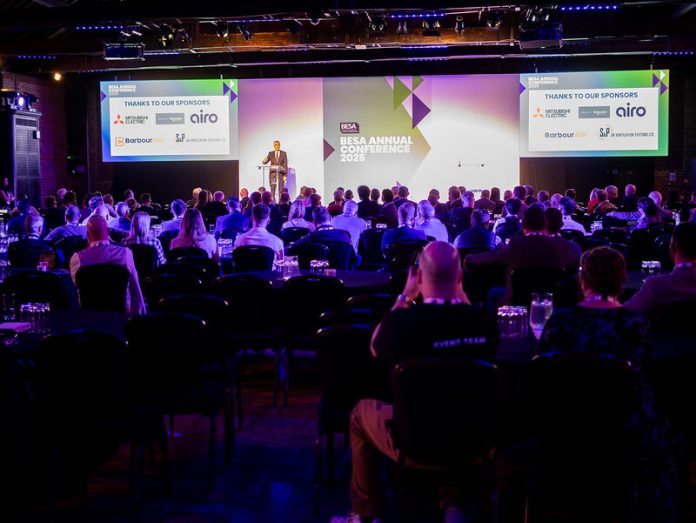Membership needs to stand for something, Building Engineering Services Association CEO tells delegates at annual conference.
A third of people in construction and its related disciplines are not interested in making the industry better, safer and more sustainable so should be driven out, according to the CEO of the Building Engineering Services Association (BESA) David Frise.
Speaking at the BESA annual conference this week, Frise said one third were highly professional, competent and compliant with legislation and best practice, the next third wanted to reach that standard and just needed help to get there, but the rest “simply don’t care”.
“We can try to drag them up…or drive them out of the industry,” Frise told the 300 delegates gathered at The Brewery in London. “Just doing enough is not good enough. We need to take control and change the things we can change so we can have a better industry, but to get there we need competent people,” he said.
BESA launched its Member Pledge initiative during the conference with several prominent members signing an agreement to put competence and compliance at the heart of their operations and encourage their supply chains to do the same.
Frise said this would create a powerful incentive for clients to specify BESA members because of their ability to prove their competence through the association’s technical audit process. He pointed to the fact that the BESA had expelled 14 members earlier this year for failing to reach the required standard.
“It might seem counterintuitive for a membership organisation to do that but believe me it works,” he said. “We now have more people waiting to join. . . membership needs to stand for something,” said Frise.
Driving competence and compliance through supply chains was also seen as an important response to the procurement practices that continue to threaten the future of many specialist firms. “Procurement is killing our industry,” said Remi Suzan, managing director of Gratte Brothers Group, who referenced the recent insolvencies of ISG and HE Simm “among others”. “We must be able to work to an acceptable profit margin. . . and there is far too much unfair transfer of risk to supply chains. Clients are not bad people, but they will not voluntarily take risk off the table. . . and unfortunately there is always someone willing to accept a project on any terms,” said Suzan.
He added that the quality of tender information had been falling steadily for some time which made it harder to price work accurately. Lilly Gallafent, director at Cast Consultancy, admitted that consultants were part of the problem because they advised clients on what levels of risk to accept.
“Change needs to start with clients. . . and we need to persuade them that even if they feel they have ‘won’ now [in a contract negotiation] they won’t feel that in a few years’ time [when all the problems become apparent],” said Gallafent. “They need to stop dumping risk on their supply chains. . . there are better models out there, but we are not using them. We do try to allocate risk more equitably by analysing it properly, but the client needs to be willing,” she said.
Noble Francis from the Construction Products Association said things were no better in the public sector. He said civil servants struggled to get projects ‘green lit’ by the Treasury if they tried to specify something over the allocated budget in a bid to achieve better long-term value and quality. “The government has lots of theory and value matrices about how to improve procurement, but this rarely reflects reality. . . and the industry knows how it works so there will always be companies bidding work at the lower level,” he told the BESA conference.




